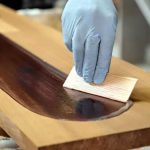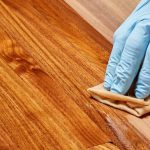Polyurethane Vs Epoxy Wood Finish: Which One Is Better?
To preserve and regain the natural appearance of the wood, the right finish is necessary. Now what is the right finish for the wood? Generally, epoxy and polyurethane coating are chosen as the finish coating on wood.
So what’s the difference between polyurethane vs epoxy wood finish? Well, epoxy gives a sturdy nature to the wood, lasts long, and hides any imperfections on the wood. Whereas, polyurethane protects the wood from environmental damage, saves time, and gives a natural finish to the wood.
Nevertheless, the rest of the decision depends on the consumer. Which coating would give the desired outcome? And what is preferable? All the answers to these questions are added in the below section. Let’s get into it!
Table: Comparison Between Polyurethane Vs Epoxy Wood Finish
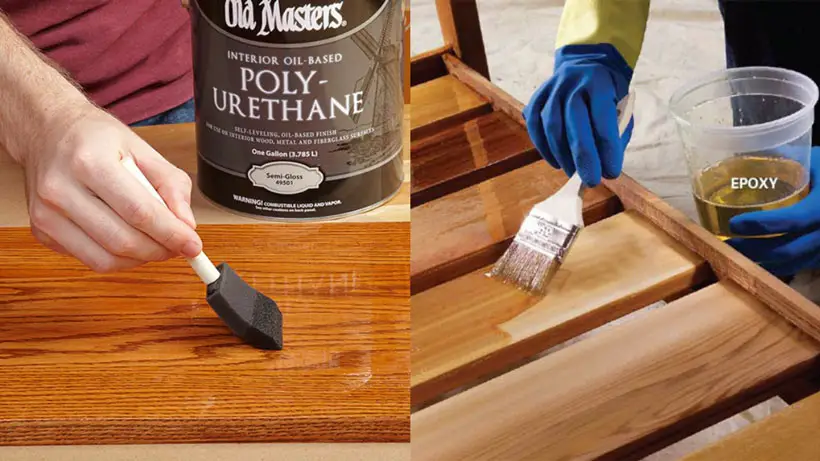
Below given is a comparison table between polyurethane vs epoxy, wood finish with their key features added.
| Parameter | Epoxy | Polyurethane |
|---|---|---|
| Durability | Lasts for 5-10 years in normal condition | Lasts for 5-10 years even in extreme environmental conditions |
| Appearance | Matte | Shiny, semi-matte, and matte |
| Discoloration | Prone to get discolored | Remains intact |
| Abrasion resistant | Low | High |
| Consistency | Thick | Thin |
| Humidity and moisture resistant | Can stand below 90% | Can stand below 70% |
| Drying time | 72 hours for complete drying | 24-48 hours for complete drying |
| Resistant to temperature change | Can stand up to 65-degree Celsius | Can stand up to 90-degree Celsius |
| Price | Visit Amazon | Visit Amazon |
A Complete Comparison Between The Polyurethane Vs Epoxy Wood Finish
The above table shows the differences between polyurethane vs epoxy wood finish. To get a detailed view of both of the finishes, follow the below section.
Durability
Both epoxy and polyurethane are durable and remain in stable condition for a long time.
Polyurethane is a flexible coating that can resist any scratches and abrasions. The coating gets toughened when dried and can be spread evenly. As a result, full protection is ensured on the surface of the wood.
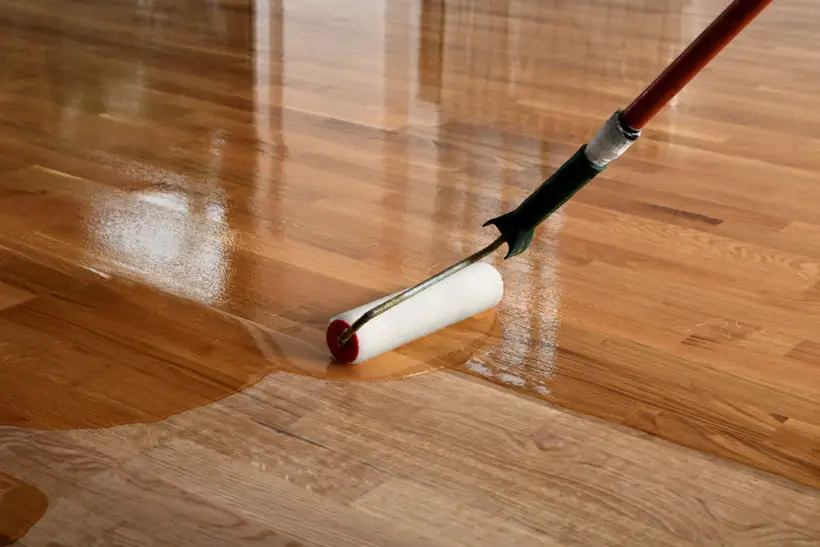
On the other hand, the chemical mixture of epoxy is strongly bonded which offers a tougher structure. Thus the coating is not even flexible but rather hard.
Moreover, epoxy gives a sturdy finish to the surface of the product. But at the same time, it is more prone to scratches. Still, epoxy is a stronger coat than any other finish except for polyurethane.
Well, Both of the coatings can last up to 5-10 years. But the only difference is epoxy coating can not stand extreme weather conditions. Moreover, it would get affected the most.
But polyurethane can stand for long even under the influence of extreme weather conditions.
Lastly, the epoxy coating does not seem to last long in comparison to polyurethane. Because it can not stand the damage for long when compared with polyurethane.
Appearance
Well, epoxy gives a fully matte appearance after application. In order to provide a shiny finish, the epoxy coating would need further application and processing. You need to apply a polisher to get the desired shiny look on the finish.
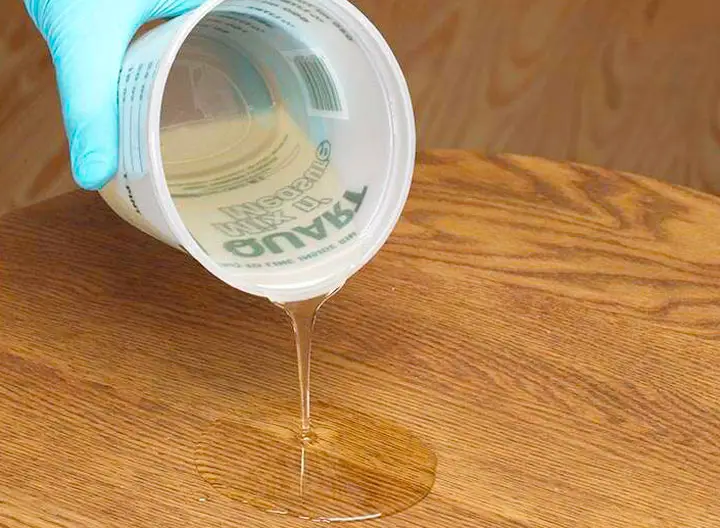
While polyurethane can provide a matte, shiny or semi-matte finish to the surface of the product. Consequently, you can choose your desired finish on the product by choosing the right coating of polyurethane. You do not even need to go through the extra hassle of applying other coatings on the polyurethane finish. Thus it saves time as well.
Discoloration
The epoxy finish is prone to discoloration when exposed to UV light. As a result, long exposure to sunlight can lead to yellowing of the color of the coating. This also fades away the natural appearance of the wood.
In the case of polyurethane, the coating does not get discolored even when the product is kept under prolonged sun exposure. That’s why the color lasts so long, and so does the life of the coating. Furthermore, the natural color of the wood is also preserved by applying the polyurethane finish.
Abrasion Resistant
Both the polyurethane and epoxy finish gives a hardened texture on the surface of the wood.
In the case of polyurethane, the tough texture can resist any harsh weather conditions. Even further scratches and damages do not get too visible after the application of the coating. The coating is also resistant to environmental damage, cracks, and scratches. As a result, it gives a smooth finish that lasts longer without any sign of harm.
But in the case of epoxy finish, it becomes hard to hide the scratches. Even a slight scratch would appear as a crack on the surface. Moreover, the finish is also very sensitive to damage.
Consistency
The epoxy coating is mainly thicker in consistency which can fill any prior cracks on the wood or any products. As a result, any hole, and uneven texture can be easily smoothed by applying a single coat of epoxy.
Whereas, polyurethane is thinner in consistency and hardly can cover the holes and cracks. However in order to get rid of the uneven texture, sanding is necessary. Which can only be done after drying the coating.
Humidity And Moisture Resistance
The humidity and moisture level in the environment affects the finish of the coatings.
Epoxy can stand the high humidity in comparison to polyurethane.
It can stay unaffected even at a humidity level up to 90%.
At the same time, both are moisture-resistant and can protect the surface from damage caused by water.
However, polyurethane coating becomes uneven and does not set on the surface if the humidity level is too high during application. It can only stay strong when the humidity level is still below 70%.
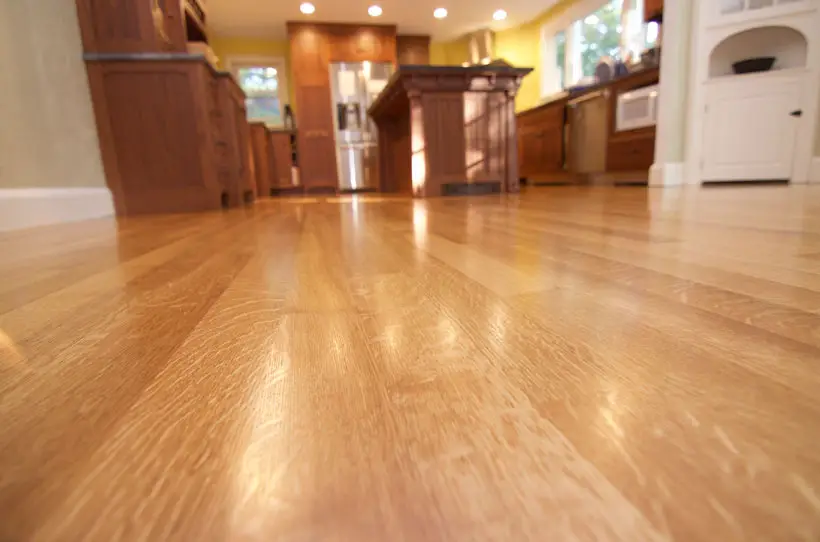
In high humidity, the coating becomes sensitive and prone to damage. That’s why, in places where a high humid level is present, epoxy is more suitable as the finish.
Drying Time
Epoxy generally takes more time in drying than polyurethane.
The epoxy finish takes about 72 hours for complete drying. Without being dried completely, no sanding can be done on the coating.
Whereas the polyurethane finish takes 24 to 48 hours. Afterward, one can apply more coats on the finish.
The oil-based polyurethane dries within 48 hours and liquid-based polyurethane takes about 24 hours to fully dry.
No matter what the coating is, it would require a month for getting fully cured.
But the application process can finish as soon as the coating dries. One can only re-apply the coat or sand after drying the previous coat fully. Thus polyurethane can save time by facilitating the drying process.
Resistant To Temperature Change
Polyurethane can stand high-temperature changes than epoxy.
Well, polyurethane can cope with the temperature changes. And it can stand even at a temperature of 90 degrees Celsius. When the coated product is exposed to high temperatures, the coating can become expanded. This flexibility makes it less prone to cracking.
Similarly, when exposed to low temperatures, the coat will contract along with the material. As a result, the long life of the product can be ensured.
But the epoxy coating is not flexible and does not change with the application of heat. Moreover, it can only resist up to 65 degrees Celsius temperature. Instead, when exposed to severe changes in temperature, the epoxy coating can become cracked.
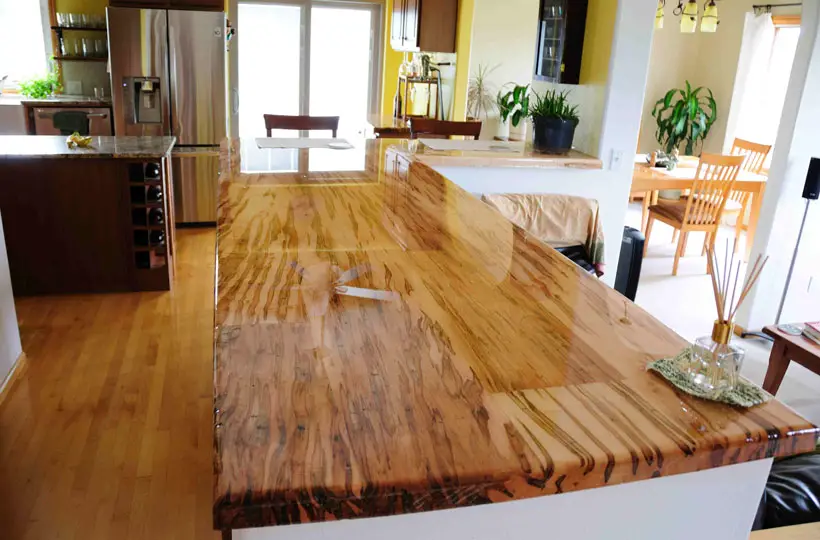
Thus, it also reduces the life of the coating. That’s why the epoxy coating is not suitable for use in products that are continuously exposed to severe temperature changes or heat.
Price
The price of the polyurethane finish varies with its type. There are generally two types of polyurethane finish; oil-based polyurethane and liquid polyurethane. Well, both are similar except for the appearance that they provide after finishing the coating.
Polyurethane coating generally costs between $20- $150. However, the price of polyurethane is higher than the epoxy coating of any type because epoxy coating costs between $30-$50 only.
Which Is Better Polyurethane Vs Epoxy Wood Finish?
Well, both polyurethane and epoxy coating can be used on the wood. But the differences between the two coatings lie in the preference of the consumer.
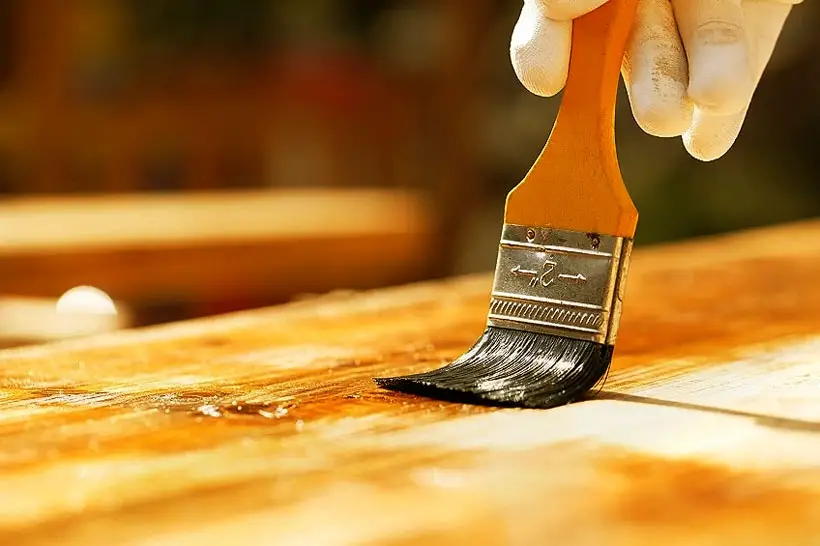
Epoxy
- The epoxy finish gives a clear, transparent, and matte finish to the wood after finishing the project.
- It is also water, chemical, corrosion, and abrasion resistant.
- Consequently, it lasts longer due to its strength and rigid nature.
- The coating also gives a sturdy texture that does not get easily damaged. But it is more prone to scratches. Any scratches on the coating would appear highlighted. As a result, the marks do not appear to be good at first glance.
- Also, the epoxy coating requires a proper mixture of epoxy resin and hardener. A slight difference in the proportion of the components can lead to the coating not being set. Thus, it becomes tougher to fix the settling of the epoxy finish. And takes more time to get an even texture.
- Moreover, it takes almost 72 hours to completely dry the coating. You have to leave the coating for at least 5 days, before applying another coat or sanding. Otherwise, the coating would get deteriorated and would lose its stability.
- Lastly, the epoxy coat gives a matte finish which fades away the natural appearance of the wood.
If you do not want the natural wood color to go away, you should not choose epoxy. But if the epoxy finish is compared with a polyurethane finish, polyurethane comes with more advantages.
Polyurethane
- Polyurethane is durable, water resistant, abrasion, and chemical resistant like the epoxy finish but lasts longer than epoxy.
- It can also be mixed with a hardener to increase its protective properties.
- It is also heat resistant and can stand at high temperatures without getting damaged.
- No matter if it’s summer or winter, the coating would hardly get affected by the environmental conditions. If the wood is constantly exposed to the environment, a polyurethane finish would protect the wood from environmental damage.
- The high stability of the coating also prevents discoloration. Thus the natural wood color can be preserved by applying polyurethane.
- Apart from that, it also gives the option to customize the appearance of the wood. It can be semi-matte, matte, or glossy.
- Moreover, it takes only 24 to 48 hours to completely dry the coating. Afterward, you can either sand the coating or reapply another coat.
It definitely saves time and provides the finished product within a short time.
You can also follow the below youtube video to get a more precise idea of both coats.
FAQs
Let’s go through some of the commonly asked questions by you guys.
Q: Is polyurethane 100% waterproof?
No, polyurethane only makes the surface of the materials resistant to water. But the material does not become completely waterproof rather resistance to water makes the coat last long.
Q: How long does wood epoxy last?
The wood epoxy can last 2-20 years with proper maintenance. If they are constantly exposed to harsh environments, the life of the coating decreases.
Q: Does epoxy darken wood?
Yes, the epoxy coating results in darkening the color of the wood. Even though it is a transparent finish, the color of the wood would become more prominent with the application of the epoxy finish.
Conclusion
Overall, choosing between polyurethane vs epoxy wood finish entirely depends on the user. Both are suitable for the wood but only differ in certain factors.
Color preservation, life, and protection from harsh weather are more guaranteed by the polyurethane coating. On the other hand, high-pressure resistance is ensured by epoxy along with being moisture, chemical, and abrasion resistant. Nevertheless, polyurethane gives similar benefits and is effective in the long run.



